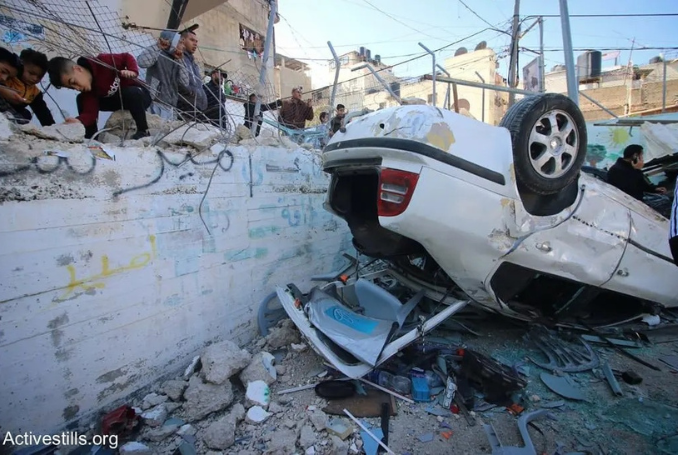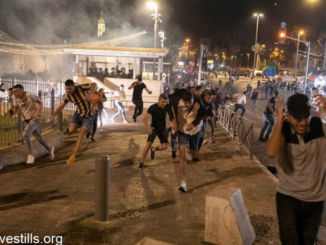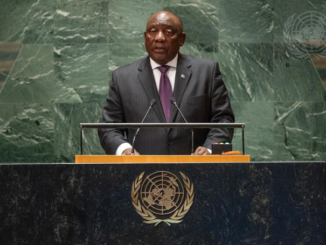
By Benay Blend
In the past few days, Palestine has witnessed heightened aggression by the Zionist government, while in the United States, five Memphis policemen brutally beat a young man to death after a routine traffic stop.
On the surface, these events are not related. A closer look at mainstream news coverage as well as systemic problems embedded in each society reveals how much they have in common.
On January 26, 2023, an article by Samidoun: Palestinian Prisoner Solidarity Network led with the headline “Massacre in Jenin: Resistance Continues Amid Occupation Killing of at Least 9 Palestinians,” followed by a photo of grieving women. The caption reads “Jenin bleeds but resists,” which is why Israel chose to murder 9 Palestinians that day, including a 61-year-old woman.
When CNN covered the same event it quoted no Palestinians, except for the Palestinian Authority (PA), but merely repeated justifications for the massacre from Israeli security forces, specifically that they were after a “terror squad [operating in Jenin] belonging to the Islamic Jihad terror organization.”
In this way, mainstream news turns resistance fighters into “terrorists” by quoting the perpetrators of the violence. “The Islamic Jihad terror operatives were heavily involved in executing and planning multiple major terror attacks, including shooting attacks on IDF soldiers and Israeli civilians,” the joint statement from the Israel Defense Forces, Israel Security Agency and Border Police said, thereby defending a preemptive massacre based on what might or might not happen.
On January 7, 2023, five Memphis police stopped Tyre Nichols, a young black man, for alleged “reckless driving.” In early reporting, CNN said that “a confrontation occurred” between the driver and police, after which he “fled on foot.” When the police apprehended him “another confrontation occurred” followed by his arrest.
After the release of bodycam footage and a surveillance camera mounted to a pole, the media changed its story. What the recordings showed was not a “confrontation,” but five black policemen viciously using their fists and a baton to beat a young, handcuffed man to death. The initial reaction is important, though, because it illustrated the ways that mainstream media listened only to the police in much the same way that they accepted as truth what Zionist officials held as their version of the massacre in Jenin.
In both cases, there is no effort to analyze cause and effect. Events are portrayed as singular in form, as if the occupation had not been abusing the occupied since 1948 as if there had never been a black person murdered by the police before Tyre Nichols.
In the foreword to Ramzy Baroud’s The Last Earth: A Palestinian Story (2018), Ilan Pappé describes Al-Nakba al-Mustamera, the ongoing Nakba (catastrophe), which he writes is “a common Palestinian reference to the age and time they have been living in during the last seventy years” (p. xi). In other words, the Nakba of 1948 is not merely a historical event but rather it comprises all of the oppression that they have been living under to this day.
“And indeed,” continues Pappé, “examining the history of the Zionist movement in Palestine, it transpires clearly that the settler colonial project that commenced in the late nineteenth century is not over yet; as is the struggle against it” (p. xi).
Yet Western media seldom looks back at the Zionist entity’s actions that resulted in a response, so consequently, resistance fighters are portrayed as terrorists whose deaths are justified in this light. Since the massacre at Jenin, there have been several reprisals on the part of the resistance, the first, the shooting of several Israelis in a Jerusalem synagogue, portrayed by police chief Yaakov Shabtai as “one of the worst terror attacks in the past few years.”
There is very little mention of what promoted the shooting, not only the massacre in Jenin but also the 75 years that came before it. In her recent book Imagining Palestine: Cultures of Exile and National Identity (2023), Tahrir Hamdi explains that “the violence of the colonizer is aimed at dehumanization and repression, but the violence of the colonized is meant to end that repression and to rehumanize the oppressed” (p. 146.) In this way, she continues, the colonized undergoes a transformation of the colonized into an “empowered being who is able to create the kind of fear in the colonizer that the colonizer created in the colonized” (p. 147).
This lack of context carries over to the United States each time a person of color, but also the poor of any race, are murdered by the police. “This is not just a professional failing,” Police Chief Cerelyn “CJ” Davis said. “This is a failing of basic humanity toward another individual. This incident was heinous, reckless and inhumane. And in the vein of transparency, when the video is released in the coming days, you will see this for yourselves.”
In this way, the murder of Tyre Nichols by the police is treated as a lone event committed by a couple of individuals who lacked humanity. Nevertheless, as activist/journalist Jon Jeter notes, the goal of the news and entertainment industry is to “decontextualize violence such as that visited upon this young brotha in Memphis and depict it as an isolated, aberrant occurrence.”
The reality is more “grotesque,” he adds, than the horrible scenes witnessed on the tapes. “America is an apartheid state,” he concludes (and here Jeter might include “Israel” as it is much the same). “It is organized around the principle of white supremacy.” So when it “terrorizes 42 million black people on the streets, in the schools, and courtrooms and workplaces,” the goal is to convince their targets that they are a “defeated people, and that any effort to resist is futile.”
As grass-roots organizer Bree Newsome Bass stated on Twitter: “How can it be racist if the police are Black? Because the institution of policing itself is racist.” Dating back to the days when Black people worked on the slave patrols, there as always been racism embedded in the system, so no amount of promoting diversity on the force will help. What is important is that people of color and the poor are most often victims of the system.
There are other similarities between the Zionist state and this culture of violence in the United States. When asked if the five police, in this case, will likely be indicted for their crimes, Ajama Baraka replied:
“They are scheduled to be sacrificed for the system – so yeah. Even if it is on lesser charges. That is why the Feds are around also. They will prosecute also if the state charges don’t stick. This is way beyond Memphis now. It is an ideological issue for the settler state globally so they are toast.”
Indeed, policing in the United States is a global issue. Palestine is Here, a website that tracks various exchanges with the Zionist state has documented that the Memphis police department has long sent its officers to Israel for training. In 2002, shortly after 911, the first training expedition took place under the guise of learning about “counter-terrorism,” which translated to mean how to deal with the unruly populations in your country. “Rather than promoting security for all, these programs facilitate an exchange of methods of state violence and control, including mass surveillance, racial profiling, and suppression of protest and dissent.”
Considering that policing began as a method to catch enslaved people who had run away from their masters, the force would still be racist even without the benefit of learning from their Israeli counterparts. Still, it links both settler colonial states in a common purpose: to control the oppressed in both countries.
“Jenin is bleeding and resisting,” concludes Samidoun, yet it is “refusing security coordination with the occupation and continuing to struggle, despite massacre after massacre, with the entire Palestinian people for the liberation of Palestine.” Despite all efforts to erase, intimidate, and invoke fear in the beleaguered population in Palestine and the US as well, the struggle for liberation goes on invoking all of us to support the occupied in their struggle for liberation and justice around the world.

– Benay Blend earned her doctorate in American Studies from the University of New Mexico. Her scholarly works include Douglas Vakoch and Sam Mickey, Eds. (2017), “’Neither Homeland Nor Exile are Words’: ‘Situated Knowledge’ in the Works of Palestinian and Native American Writers”. She contributed this article to The Palestine Chronicle.







